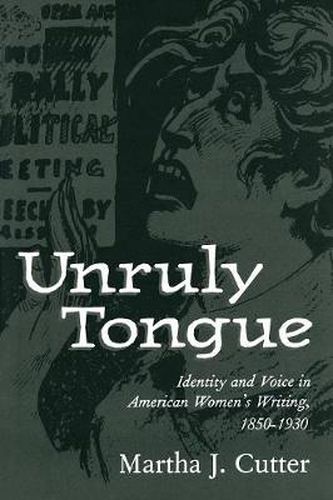Unruly Tongue: Identity and Voice in American Women's Writing, 1850-1930
Martha J. Cutter

Unruly Tongue: Identity and Voice in American Women’s Writing, 1850-1930
Martha J. Cutter
This title is printed to order. This book may have been self-published. If so, we cannot guarantee the quality of the content. In the main most books will have gone through the editing process however some may not. We therefore suggest that you be aware of this before ordering this book. If in doubt check either the author or publisher’s details as we are unable to accept any returns unless they are faulty. Please contact us if you have any questions.
Women should be seen and not heard. That was a well-known maxim in nineteenth century America. American women writers–such as Louisa May Alcott, Kate Chopin, and Willa Cather–devised a brilliant method for crashing that barrier to creativity. In her new book, UNRULY TONGUE: IDENTITY AND VOICE IN AMERICAN WOMEN’S WRITING, 1850-1930 (University Press of Mississippi, $40, cloth) Martha Cutter says the ten African American and Anglo American women she studied wrote as inside agitators. Over time they created a new theory of language. Cutter says, From 1780 to 1860 American writers were preoccupied with the feminine virtues of purity, piety, submissiveness, and domesticity–a constellation of attributes known as the domestic saint, or True Woman. But that soon changed. As more women were educated and more women began to work outside the home, women writers found a need to express themselves with a growing sense of independence. In the first years covered by her book, Cutter found writers Fanny Fern, Harriet Wilson, and Louisa May Alcott employing female characters who stayed within their domestic roles and stuck to a very submissive script.
The years from 1850 to 1930 reflected a great deal of cultural change, Cutter says, as the New Woman gradually displaced the True Woman, and the domestic voice was replaced by one that was more concerned with the theoretical basis of women’s silencing. In this atmosphere, Cutter finds writers Anna Julia Cooper, Mary Wilkins Freeman, Charlotte Perkins Gilman, Frances Harper, and Kate Chopin writing about women who bring unruly tongues and independent thinking to traditional female roles. These writers enabled those that followed, such as Willa Cather and Jessie Fauset, to create characters with masculine and racist voices and undermine those characters from the inside. Throughout her book, Cutter discovers how these ten writers, even those who wrote in what appears to be a purely feminine and domestic voice, found ways to rethink language and create new identities and new voices that were both feminine and unruly. Martha J. Cutter is an assistant professor of English at Kent State University. She has contributed critical essays to Mary Wilkins Freeman: A Study of Short Fiction, The Politics of Passing, The Canon in the Classroom, and many scholarly journals.
This item is not currently in-stock. It can be ordered online and is expected to ship in 7-14 days
Our stock data is updated periodically, and availability may change throughout the day for in-demand items. Please call the relevant shop for the most current stock information. Prices are subject to change without notice.
Sign in or become a Readings Member to add this title to a wishlist.

